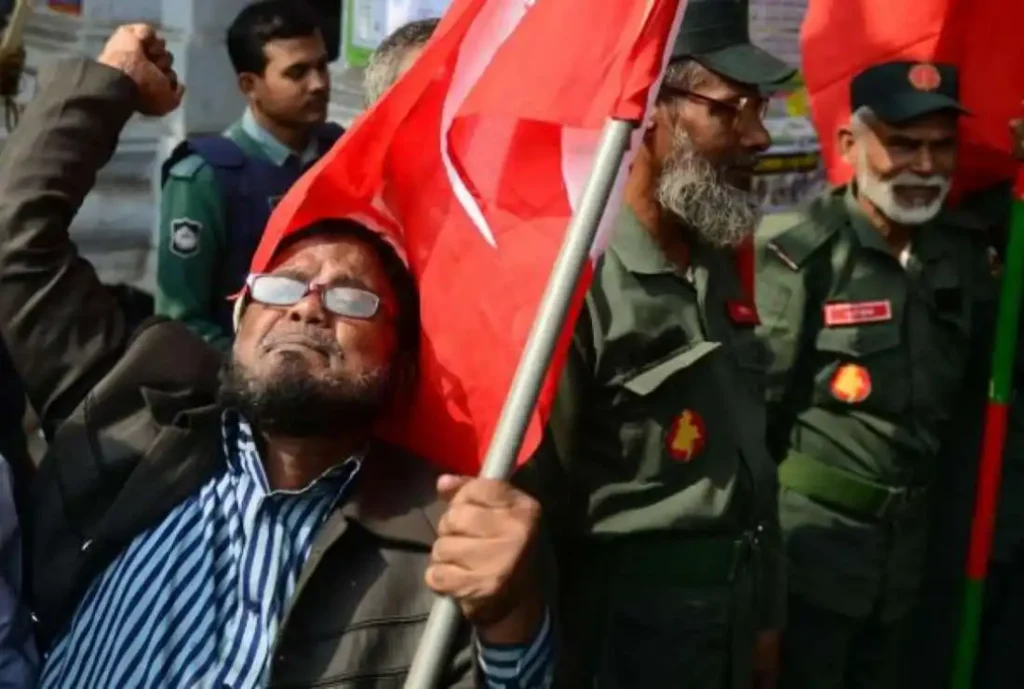Bangladesh so far sentenced 135 out of 155 accused of war crimes during the 1971 War of Independence
Demonstrators march outside the war crimes tribunal in Bangladeshi capital Dhaka in this file image. (Photo: AFP)
A global rights body has decried the death sentence for four Bangladeshi politicians for alleged war crimes, saying the trial process failed to ensure fairness and justice.
The Human Rights Watch (HRW) opposes “the death penalty as inherently cruel and irreversible,’ the group’s deputy Asia director Meenakshi Ganguly said.
HRW has always called for prosecutions to ensure that those that led the abuses in 1971 should be held to account through proper trials that are fair and credible, she said in an email to UCA News.
“We have repeatedly called on the Bangladesh government to ensure such proper accountability. It is unfortunate, however, some of the sons of those being prosecuted have become victims of enforced disappearances, because that does not reflect well on the justice process,” she said.
Ganguly reacted after a three-judge bench of the International Crimes Tribunal handed down the death penalty to the accused on four charges — abduction, confinement, murder, and torture — in the Jashore region during the 1971 Bangladesh war of independence from Pakistan.
The convicts – Amzad Hossain Mollah, Fosiar Rahman, Mohammad Ohab Molla and Mahtab Biswash – were involved in politics with Bangladesh Nationalist Party (BNP), the main opposition party, at some point in their lives, prosecutor Rezia Sultana told UCA News.
“All four charges against them were proved in court, and the court sentenced them to death by hanging,” said Rezia Sultana, adding that they were accused in a single case.
One of the four convicts was present when the verdict was announced, and three others were tried in absentia, she said.
Eight witnesses, including the investigation officer, testified against the convicts.
Defense lawyer Gazi Tamim rejected the verdict saying that his clients were denied justice in the trial.
“The trial was based on wrong information,” he said.
Tamim said that his clients were accused in eight war crimes cases immediately after the independence of Bangladesh in 1972 but no crime was proved against them.
“They all got relieved of war crimes charges by 1974 through trials,” he said.
This is the 52nd verdict given by the war crimes tribunal set up by Prime Minister Sheikh Hasina in 2010 as part of her electoral pledges.
The tribunal has so far sentenced 135 out of 155 accused of war crimes in Bangladesh, said the office of the prosecutor.
The court acquitted two accused, while the remaining 18 died in jail during their trial.
A total of 95 have been sentenced to death, nine were handed life terms, 25 were sentenced to be imprisoned until death, and six others got shorter jail sentences.
Bangladesh so far executed six of those sentenced to death, five of them members of the country’s largest Islamist party, the Jamaat-e Islami, and one from the main opposition, BNP.
The war crimes tribunal has popular backing due to trauma related to the wartime atrocities by the Pakistani military and its local Islamist collaborators that left tens of thousands killed and thousands of women raped amid widespread looting, arson, and torture.
However, BNP and its longtime ally Jamaat termed the tribunal a tool for political vendetta.
Rights groups including HRW called the trial flawed and short of international standards and demanded the halting of war crimes executions.
Catholic Bishops’ Conference of Bangladesh vice president Bishop Gervas Rozario said that they join with those who oppose capital punishment in any crimes.
“There are many ways of avoiding the punishment that allows humans to take another human’s life,” he said.

